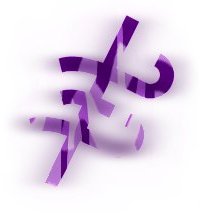    This very question was bugging me recently (well, not that much). So, imagine you have 0.99999... followed by an infinite numbers of 9's. For the sake of brevity, I will use three dots to represent recurring. Hence, 0.9... = 0.9 followed by an infinite number of 9's. But does 0.9... = 1? On the face of it, you would think, "Erm, no. 0.9 recurring is very close to 1 but it's not actually 1." However, consider the following proof (many thanks to Tim for this):
This very question was bugging me recently (well, not that much). So, imagine you have 0.99999... followed by an infinite numbers of 9's. For the sake of brevity, I will use three dots to represent recurring. Hence, 0.9... = 0.9 followed by an infinite number of 9's. But does 0.9... = 1? On the face of it, you would think, "Erm, no. 0.9 recurring is very close to 1 but it's not actually 1." However, consider the following proof (many thanks to Tim for this):
Let s = 1 + x + x2 + ... + x{n - 1} (Equation 1) Then (1 - x)s = 1 + x + x2 + ... + x{n - 1} - (x + x2 + ... + xn) = 1 - xn So, if I divide both sides by (1 - x), | s = | 1 - xn | (provided x is not equal to 1) |
| | 1 - x |
Now suppose -1 < x < 1. Then xn tends to 0 as n tends to infinity, so s tends to 1 / (1 - x) as n tends to infinity, i.e. 1 + x + x2 + ... (going on for ever) = 1 / (1 - x). Putting this down in an equation: | s = | 1 | (for -1 < x < 1) (Equation 2) |
| | 1 - x |
With me so far? I found it easiest to go through all of this on pen and paper. Anyway, assuming all this makes sense, we can solve the equation with a specific value of x. So, let's let x = 0.1 = 1 / 10. So, according to equation 1: s = 1 + x + x2 + ... + x{n - 1} = 1 + 0.1 + 0.01 + 0.001 + ... = 1.1... (that is, the 1's go on forever) Also, according to equation 2, we have: | s = | 1 | (Equation 3) |
| | 1 - 0.1 |
Rearranging slightly, we get: s = 10 / 9 But we already know what s is from above. s = 1.1..., so therefore: 1.1... = 10 / 9 Divide both sides by 10, hence: 0.1... = 1 / 9 Multiply both sides by 9, hence: 0.9... = 1  Of course, it should be obvious that this equation only holds when we have an infinite number of 9's (but surely that's implied by 'recurring'). Recall how we were able to exclude the xn term as this tended to zero as n tended to infinity (for -1 < x < 1). So perhaps our equation could also be written thus: Of course, it should be obvious that this equation only holds when we have an infinite number of 9's (but surely that's implied by 'recurring'). Recall how we were able to exclude the xn term as this tended to zero as n tended to infinity (for -1 < x < 1). So perhaps our equation could also be written thus:
0.999999 (i.e. number of 9's = n) → 1 as n → ∞ (the right arrow symbol, →, denotes 'tends to' or 'approaches'). So, yes . . . I think 0.9 recurring does indeed equal 1. That's the weirdness of infinity, I guess.
| 





